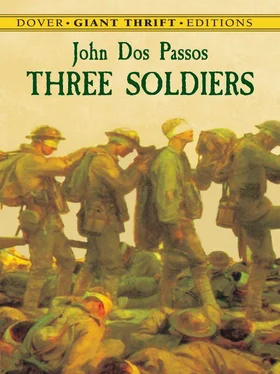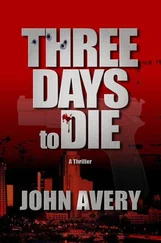John Passos - Three Soldiers
Здесь есть возможность читать онлайн «John Passos - Three Soldiers» весь текст электронной книги совершенно бесплатно (целиком полную версию без сокращений). В некоторых случаях можно слушать аудио, скачать через торрент в формате fb2 и присутствует краткое содержание. Жанр: Историческая проза, Детектив, на английском языке. Описание произведения, (предисловие) а так же отзывы посетителей доступны на портале библиотеки ЛибКат.
- Название:Three Soldiers
- Автор:
- Жанр:
- Год:неизвестен
- ISBN:нет данных
- Рейтинг книги:3 / 5. Голосов: 1
-
Избранное:Добавить в избранное
- Отзывы:
-
Ваша оценка:
- 60
- 1
- 2
- 3
- 4
- 5
Three Soldiers: краткое содержание, описание и аннотация
Предлагаем к чтению аннотацию, описание, краткое содержание или предисловие (зависит от того, что написал сам автор книги «Three Soldiers»). Если вы не нашли необходимую информацию о книге — напишите в комментариях, мы постараемся отыскать её.
Three Soldiers — читать онлайн бесплатно полную книгу (весь текст) целиком
Ниже представлен текст книги, разбитый по страницам. Система сохранения места последней прочитанной страницы, позволяет с удобством читать онлайн бесплатно книгу «Three Soldiers», без необходимости каждый раз заново искать на чём Вы остановились. Поставьте закладку, и сможете в любой момент перейти на страницу, на которой закончили чтение.
Интервал:
Закладка:
“I’d put it about the first of May,” answered Henslowe, amid a sound of splashing. “Gee, it’ld be great to be a people’s Commissary… You could go and revolute the grand Llama of Thibet.”
“O, it’s too deliciously preposterous,” cried Andrews, letting himself slide a second time into the bathtub.
II
TWO M.P.’s passed outside the window. Andrews watched the yellow pigskin revolver cases until they were out of sight. He felt joyfully secure from them. The waiter, standing by the door with a napkin on his arm, gave him a sense of security so intense it made him laugh. On the marble table before him were a small glass of beer, a notebook full of ruled sheets of paper and a couple of yellow pencils. The beer, the color of topaz in the clear grey light that streamed in through the window, threw a pale yellow glow with a bright center on the table. Outside was the boulevard with a few people walking hurriedly. An empty market wagon passed now and then, rumbling loud. On a bench a woman in a black knitted shawl, with a bundle of newspapers in her knees, was counting sous with loving concentration.
Andrews looked at his watch. He had an hour before going to the Schola Cantorum.
He got to his feet, paid the waiter and strolled down the center of the boulevard, thinking smilingly of pages he had written, of pages he was going to write, filled with a sense of leisurely well-being. It was a grey morning with a little yellowish fog in the air. The pavements were damp, reflected women’s dresses and men’s legs and the angular outlines of taxicabs. From a flower stand with violets and red and pink carnations irregular blotches of color ran down into the brownish grey of the pavement. Andrews caught a faint smell of violets in the smell of the fog as he passed the flower stand and remembered suddenly that spring was coming. He would not miss a moment of this spring, he told himself; he would follow it step by step, from the first violets. Oh, how fully he must live now to make up for all the years he had wasted in his life.
He kept on walking along the boulevard. He was remembering how he and the girl the soldier had called Jeanne had both kindled with uncontrollable laughter when their eyes had met that night in the restaurant. He wished he could go down the boulevard with a girl like that, laughing through the foggy morning.
He wondered vaguely what part of Paris he was getting to, but was too happy to care. How beautifully long the hours were in the early morning!
At a concert at the Salle Gaveau the day before he had heard Debussy’s Nocturnes and Les Sirènes. Rhythms from them were the warp of all his thoughts. Against the background of the grey street and the brownish fog that hung a veil at the end of every vista he began to imagine rhythms of his own, modulations and phrases that grew brilliant and faded, that flapped for a while like gaudy banners above his head through the clatter of the street.
He noticed that he was passing a long building with blank rows of windows, at the central door of which stood groups of American soldiers smoking. Unconsciously he hastened his steps, for fear of meeting an officer he would have to salute. He passed the men without looking at them.
A voice detained him.
“Say, Andrews.”
When he turned he saw that a short man with curly hair, whose face, though familiar, he could not place, had left the group at the door and was coming towards him.
“Hello, Andrews… Your name’s Andrews, ain’t it?”
“Yes.” Andrews shook his hand, trying to remember.
“I’m Fuselli Remember? Last time I saw you you was goin’ up to the lines on a train with Chrisfield… Chris we used to call him… At Cosne, don’t you remember?”
“Of course I do.”
“Well, what’s happened to Chris?”
“He’s a corporal now,” said Andrews.
“Gee he is… I’ll be goddamed… They was goin’ to make me a corporal once.”
Fuselli wore stained olive-drab breeches and badly rolled puttees; his shirt was open at the neck. From his blue denim jacket came a smell of stale grease that Andrews recognized; the smell of army kitchens. He had a momentary recollection of standing in line cold dark mornings and of the sound the food made slopping into mess kits.
“Why didn’t they make you a corporal, Fuselli?” Andrews said, after a pause, in a constrained voice.
“Hell, I got in wrong, I suppose.”
They were leaning against the dusty house wall. Andrews looked at his feet. The mud of the pavement, splashing up on the wall, made an even dado along the bottom, on which Andrews scraped the toe of his shoe up and down.
“Well, how’s everything?” Andrews asked looking up suddenly.
“I’ve been in a labor battalion. That’s how everything is.”
“God, that’s tough luck!”
Andrews wanted to go on. He had a sudden fear that he would be late. But he did not know how to break away.
“I got sick,” said Fuselli grinning. “I guess I am yet. It’s a hell of a note the way they treat a feller… like he was lower than the dirt.”
“Were you at Cosne all the time? That’s damned rough luck, Fuselli.”
“Cosne sure is a hell of a hole… I guess you saw a lot of fighting. God! you must have been glad not to be in the goddam medics.”
“I don’t know that I’m glad I saw fighting… Oh, yes, I suppose I am.”
“You see, I had it a hell of a time before they found out. Court-martial was damn stiff… after the armistice too… Oh, God! why can’t they let a feller go home?”
A woman in a bright blue hat passed them. Andrews caught a glimpse of a white over-powdered face; her hips trembled like jelly under the blue skirt with each hard clack of her high heels on the pavement.
“Gee, that looks like Jenny… I’m glad she didn’t see me… ” Fuselli laughed. “Ought to ’a seen her one night last week. We were so dead drunk we just couldn’t move.”
“Isn’t that bad for what’s the matter with you?”
“I don’t give a damn now; what’s the use?”
“But God; man!” Andrews stopped himself suddenly. Then he said in a different voice; “What outfit are you in now?”
“I’m on the permanent K.P. here,” Fuselli jerked his thumb towards the door of the building. “Not a bad job, off two days a week; no drill, good eats… At least you get all you want… But it surely has been hell emptying ash cans and shovelling coal an’ now all they’ve done is dry me up.”
“But you’ll be goin’ home soon now, won’t you? They can’t discharge you till they cure you.”
“Damned if I know… Some guys say a guy never can be cured… ”
“Don’t you find K.P. work pretty damn dull?”
“No worse than anything else. What are you doin’ in Paris?”
“School detachment.”
“What’s that?”
“Men who wanted to study in the university, who managed to work it.”
“Gee, I’m glad I ain’t goin’ to school again.”
“Well, so long, Fuselli.”
“So long, Andrews.”
Fuselli turned and slouched back to the group of men at the door. Andrews hurried away. As he turned the corner he had a glimpse of Fuselli with his hands in his pockets and his legs crossed leaning against the wall behind the door of the barracks.
III
THE darkness, where the rain fell through the vague halos of light round the street lamps, glittered with streaks of pale gold. Andrews’s ears were full of the sound of racing gutters and spattering waterspouts, and of the hard unceasing beat of the rain on the pavements. It was after closing time. The corrugated shutters were drawn down, in front of café windows. Andrews’s cap was wet; water trickled down his forehead and the sides of his nose, running into his eyes. His feet were soaked and he could feel the wet patches growing on his knees where they received the water running off his overcoat. The street stretched wide and dark ahead of him, with an occasional glimmer of greenish reflection from a lamp. As he walked, splashing with long strides through the rain, he noticed that he was keeping pace with a woman under an umbrella, a slender person who was hurrying with small resolute steps up the boulevard. When he saw her, a mad hope flamed suddenly through him. He remembered a vulgar little theatre and the crude light of a spot light. Through the paint and powder a girl’s golden-brown skin had shone with a firm brilliance that made him think of wide sun-scorched uplands, and dancing figures on Greek vases. Since he had seen her two nights ago, he had thought of nothing else. He had feverishly found out her name. “Naya Selikoff!” A mad hope flared through him that this girl he was walking beside was the girl whose slender limbs moved in an endless frieze through his thoughts. He peered at her with eyes blurred with rain. What an ass he was! Of course it couldn’t be; it was too early. She was on the stage at this minute. Other hungry eyes were staring at her slenderness, other hands were twitching to stroke her golden-brown skin. Walking under the steady downpour that stung his face and ears and sent a tiny cold trickle down his back, he felt a sudden dizziness of desire come over him. His hands, thrust to the bottom of his coat pockets, clutched convulsively. He felt that he would die, that his pounding blood vessels would burst. The bead curtains of rain rustled and tinkled about him, awakening his nerves, making his skin flash and tingle. In the gurgle of water in gutters and water spouts he could imagine he heard orchestras droning libidinous music. The feverish excitement of his senses began to create frenzied rhythms in his ears:
Читать дальшеИнтервал:
Закладка:
Похожие книги на «Three Soldiers»
Представляем Вашему вниманию похожие книги на «Three Soldiers» списком для выбора. Мы отобрали схожую по названию и смыслу литературу в надежде предоставить читателям больше вариантов отыскать новые, интересные, ещё непрочитанные произведения.
Обсуждение, отзывы о книге «Three Soldiers» и просто собственные мнения читателей. Оставьте ваши комментарии, напишите, что Вы думаете о произведении, его смысле или главных героях. Укажите что конкретно понравилось, а что нет, и почему Вы так считаете.












